For Royal Smit & Zoon, it’s important that everything we do is built on a strong foundation. Here we describe our commitments towards Governance, focusing on our ESG Roadmap 2025 commitments.
Achievements
Governance
All incentive programs include ESG targets
Over the preceding years, Board of Management and a selection of key management positions and specific job holders already had ESG targets as part of their incentive programs. This practice confirmed our belief that integrating sustainability related performance in incentive schemes is instrumental in continuous improvement. Personal ESG targets empower our employees to integrate our Guiding Principles in their daily work, align their actions with our mission of ‘creating a socially and environmentally sustainable leather value chain together’ and contribute to our ESG ambitions. In 2023, we integrated ESG targets for all key management positions (including the Board of Management and their direct reports) and all specific job holders into the incentive programs.
Each individual’s ESG target was collaboratively defined with their line manager, Human Resources and our ESG Director. This approach ensured that the ESG targets suited the employees’ areas of responsibility, were practical and advanced our ESG ambitions. The Board of Management approved the set ESG targets. Special emphasis was placed on addressing historical challenges, such as the gap in ESG targets for our technical sales employees. Concreted efforts were directed to engaging this group and define suitable and effective ESG targets. ESG Targets weighted 10% in the overall variable remuneration opportunities.
The ESG targets for 2023 encompassed a range of initiatives. This included engaging our customers, brands and suppliers in our Double Materiality Assessment and ESG Strategy update, assisting customers in achieving their ESG Targets through sustainable solutions, collaborating with our Sales Partners on the safe management & handling of chemicals, optimizing our Product Passport, evaluating the ESG Performance of our Suppliers and calculating the scope 3 GHG Emissions of our downstream transport.
While the majority of ESG targets were successfully met, those aimed at our Sales Partners posed greater challenges. This can be attributed to the challenging economic landscape and travel limitations, which significantly impacted daily priorities and engagement levels, particularly for our technical sales employees. Initiating a global training program on the safe management and handling of chemicals for our Sales Partners, will actively involve them in this aspect and ensure achieving the initial target set for our technical sales employees.
For 2024, we will remain committed to incorporating ESG Targets in our incentive programs. These will be tailored to each employees’ areas of responsibility, supporting execution of our ESG Strategy.

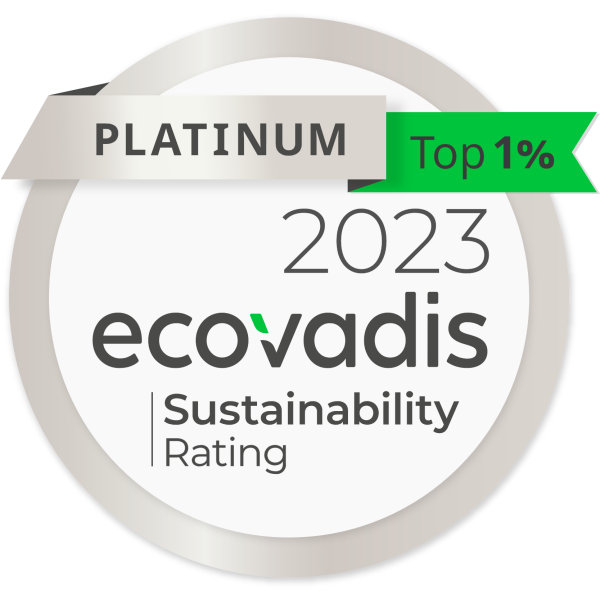
Royal Smit & Zoon started to collaborate with EcoVadis in 2015. Ecovadis is a globally recognized methodology that assesses the sustainability performance of more than 75.000 organisations worldwide across a range of criteria grouped into 4 impact themes: Environment”, “Labor & Human Rights”, “Ethics” and “Sustainable Procurement”. The assessment criteria are based upon international sustainable development standards such as the Global Compact Principles, the International Labour Organization (ILO) conventions, the Global Reporting Initiative (GRI) standard, and the ISO 26000 standards. These evidence-based assessments are refined into easy-to-read scorecards, providing zero to one hundred (0-100) scores, and medals (bronze, silver, gold, platinum).
In 2023, Royal Smit & Zoon proudly achieved the EcoVadis PLATINUM rating. Until 2020, we were accredited with the EcoVadis SILVER rating. In 2021 and 2022, EcoVadis accredited us with a GOLD rating. Up 15 points from 2022 (from 67 to 82 points), the EcoVadis PLATINUM rating demonstrates our ongoing efforts true to our mission to “Create a socially and environmentally sustainable leather value chain, together”. We are very proud that, with this recognition, Royal Smit & Zoon belongs to the top 1% of companies assessed by EcoVadis.
EcoVadis remains committed to the continuous improvement of its assessment, actively contributing to sustainability practices across value chains, fostering transparency and driving innovation. Originally outlined in our ESG Roadmap 2025, our KPI was to maintain the EcoVadis GOLD rating. Remarkably, we exceeded our own goal by achieving the EcoVadis PLATINUM rating already this year. While we consider this achievement a real milestone, we merely see it as a catalyst and opportunity to only guide us for ongoing improvements in the future.
EcoVadis Platinum rating rewards our ESG leadership

Our Business Partner Code of Conduct (BPCoC) has been in place since 2018 and is an integral part of our Sales Partner Agreements. At Royal Smit & Zoon, we strongly encourage our Business Partners to play a catalyzing role in not only meeting but exceeding the business principles as set forward in this Code of Conduct. In 2021, we initiated a pilot Sales Partner Program with a selection of our agents. The primary objective of this program is to ensure that our Sales Partners understand and are prepared to meet the standards and requirements in ESG practices as set by Royal Smit & Zoon and the broader leather value chain. Covid-19 travel limitations and the lockdown in China made the continuation and implementation of the pilot program during 2022 challenging.
Given our Company’s commitment to playing a positive and pivotal role within the leather value chain, collaboration with our Sales Partners on ESG standards and requirements is a key priority. Working hand in hand with our Sales Partners inevitably involves addressing a wide range of economic, environmental, and social impacts, working with industry standards, and meeting (upcoming) laws and regulations. It is only when working according to the same principles and standards that we can effectively fulfill our mission of creating a sustainable leather value chain, together.
In response to the evolving ESG landscape, in 2023, we redefined and relaunched our Sales Partner Program to assure alignment with current standards and continue driving progress and transformative action across the entire leather value chain. As a leading provider of specialty chemicals to the leather industry, safety and health comes first in all our activities. It is our duty to minimize potential risks inherent to our chemical industry operations and ensure the safe use of our chemicals. More than in any area, we expect that our Sales Partners will operate according to our principles and standards.
In 2023, we developed the “Agent recommendations for the Safe Management & Handling of Chemicals”. These recommendations, building upon our BPCoC, align with the Chemical Management Module of the latest LWG Leather Manufacturer Audit Protocol and associated ZDHC requirements.
The document's purpose is to inform our Sales Partners of the expectations placed on them regarding the safe management and handling of chemicals. Moreover, it aims to encourage and support them in meeting these expectations and enable them to show compliance with LWG and ZDHC requirements.
Early 2023, we conducted internal training for our sales and technicians worldwide on the document. We instructed them how to discuss and engage with our Sales Partners on these matters, and guide them through completing the accompanying self-check for continuous improvement - an ESG target set by our technicians for 2023. Later in 2023, we started our global training program by region for our Sales Partners on the safe management & handling of chemicals. In 2024, our objective is to have engaged all our Sales Partners across all 4 regions. Simultaneously, our technicians will continue engaging our Sales Partners on this topic to ensure facilitating an ongoing learning process on this pivotal subject.
Sales agents & distributors are involved in our Sales Partner Program


About 400,000 farmers and herdsmen in the region benefit, providing socio-economic development to the ethnic minorities in this region. Our technical collaboration centers around using our chromium-free, aldehyde-free, and heavy-metal-free tanning agent Zeology to upgrade and optimize the leather production process while significantly reducing its environmental impact. Heavy metals and pollutants from wastewater can be recovered with minimal energy consumption, and solid waste from production is compostable. At the same time, the yak leather products can be sold as recyclable and can technically be treated to turn into an eco-fertilizer (in an eco-friendly way) in 2 months. Zeology-tanned YAK leather is the lowest carbon-intensity leather in China.
We only work with key suppliers who consider sustainability to be a vital part of the way they conduct business. Our Business Partner Code of Conduct (BPCoC) is already in place since 2018. All of our suppliers worldwide are expected to work according to our BPCoC, which requires them to respect human and labor rights, responsibly use the environment and natural resources, and comply with all applicable legislation, regulations, and ethical standards. The principles and standards included in this document reflect those established in our own ESG Policy and Employee Code of Conduct. By asking our Business Partners to commit to the same principles and standards that guide our business, we facilitate a stronger and uniform commitment to creating a sustainable leather value chain. The BPCoC is also an integral part of the business agreement between Royal Smit & Zoon and the Business Partner, where possible outlined in a contractual clause. Since 2018, the BPCoC has been progressively introduced with our key suppliers 12. Targets have been set to ensure commitment from all global key suppliers worldwide by 2025. The Table above indicates the percentage of key suppliers introduced to and independently signed the BPCoC document.
Recognizing the importance of good governance in creating a sustainable leather value chain, we are committed to continuously improving responsible supply chain management. This includes ensuring suppliers meet the same criteria customers expect from us and engagement with them on environmental and social impacts and risks. Additionally, we are mindful of evolving supply chain due diligence regulations. In 2023, we therefore started the process of analyzing the EcoVadis rating from our suppliers as part of the annual supplier evaluation process. As we uphold high standards for ourselves in the EcoVadis assessment process and ranking, we consider this rating a crucial indicator of our suppliers’ performance in creating a more sustainable leather value chain. Our initial step involved assessing the current EcoVadis rating of our key suppliers 13. Based on our assessment, it is evident that Ecovadis ratings are widely used and accepted in the chemical industry, where we find the majority of our suppliers. As a result, we decided to leverage Ecovadis ratings as a relevant indicator for evaluating the ESG performance of our suppliers. As part of our ongoing efforts, we will expand this evaluation to include more suppliers, establish a target for them to attain a minimum score, and actively engage with them to adopt more responsible and sustainable practices. Above efforts also align with our commitment to advancing supply chain transparency.
We recognize the connection between responsible supply chain management and a comprehensive understanding of social and environmental risks in raw material procurement. That is why, in 2023, one member of our Purchase team achieved NEVI Private 1 training certification, covering also socially responsible procurement, ethics and sustainability. Additionally, another member of our Dutch purchasing team underwent external training on socially responsible and circular procurement. Both the EcoVadis assessment of suppliers and participation in these trainings were incorporated into our sustainable procurement objectives, integrated into the buyers’ performance reviews.
We also understand that responsible procurement of raw materials is a crucial part of building a sustainable supply chain. For example, as a large processor of fish oil and as stipulated in our ESG Policy, we only source our fish oils from fish farming or from fishing areas subject to thorough monitoring and assessment by both the FAO and local research institutes. This ensures the fish is not at risk of depletion or do not originate directly or indirectly from Illegal, Unreported and Unregulated (IUU) fishing, contributing to biodiversity protection and fostering a more sustainable supply chain.
Already in 2022 - as another example -, we partnered with a first-tier supplier on a responsible sourcing issue brought up by a customer demanding compliance with the new German Supply Chain Due Diligence Act (SCDDA), ensuring responsibly mined and processed bauxite/aluminium. Zeolite, an important ingredient of our Nera-tanning product Zeology is produced from alumina trihydrate (ATH), for which the raw material is mined bauxite. As a result of good collaboration across the value chain, we can guarantee since 2022 that the ATH used to produce the zeolite for our tanning product Zeology meets the highest ESG standards and has been certified according to the Aluminium Stewardship Initiative (ASI) standards since 2022. This way Nera guarantees that all steps in our value chain from the bauxite mining until and including the production of zeolite comply with the ASI Performance Standard and the ASI Chain of Custody Standard. ASI standards address various ESG topics such as environmental impact, material stewardship, human and labour rights, and business governance. In 2023, next to working with certified zeolite, Nera has become a member of the Aluminium Stewardship Initiative.
With our vast belief in the ‘Power of Partnerships’, this also means we collaborate with our first-tier suppliers (upstream) and Business Partners downstream. Working on a basis of respect and mutual trust while advancing on diversity, such collaborations drive continuous improvement in responsible business practices and create a real positive impact in making the leather value chain more sustainable, both upstream and downstream.
An example is our collaboration with our customer and downstream Business Partner The Third Pole of the Earth Leather Industrial Company Ltd., a state-owned tannery enterprise in Xizang (Tibet Autonomous Region) that produces leather from local hides into the brand YAK.
Our key suppliers commit to our Business Partner Code of Conduct

12 This concerns suppliers related to Dutch entity. Key suppliers have an annual spend of over Euro 200K and cover 80% of the top spend.
13 Our initial step involved assessing the current EcoVadis rating of our key suppliers.
14 This concerns suppliers related to all global entities. Key suppliers have an annual spend of over Euro 200K and cover 80% of the top spend.
In 2023, the Employee Code of Conduct (ECoC) for the Netherlands was updated from its original 2021 version and communicated across the Dutch entities of Royal Smit & Zoon. This enhanced version of our Employee Code of Conduct is the result of integration of insights from various third-party audits, reflecting our commitment to continuous improvement. We adhere to the Plan-Do-Check-Act, showing our dedication to best practices also in this domain.
Our Employee Code of Conduct (ECoC) guides our day-to-day business

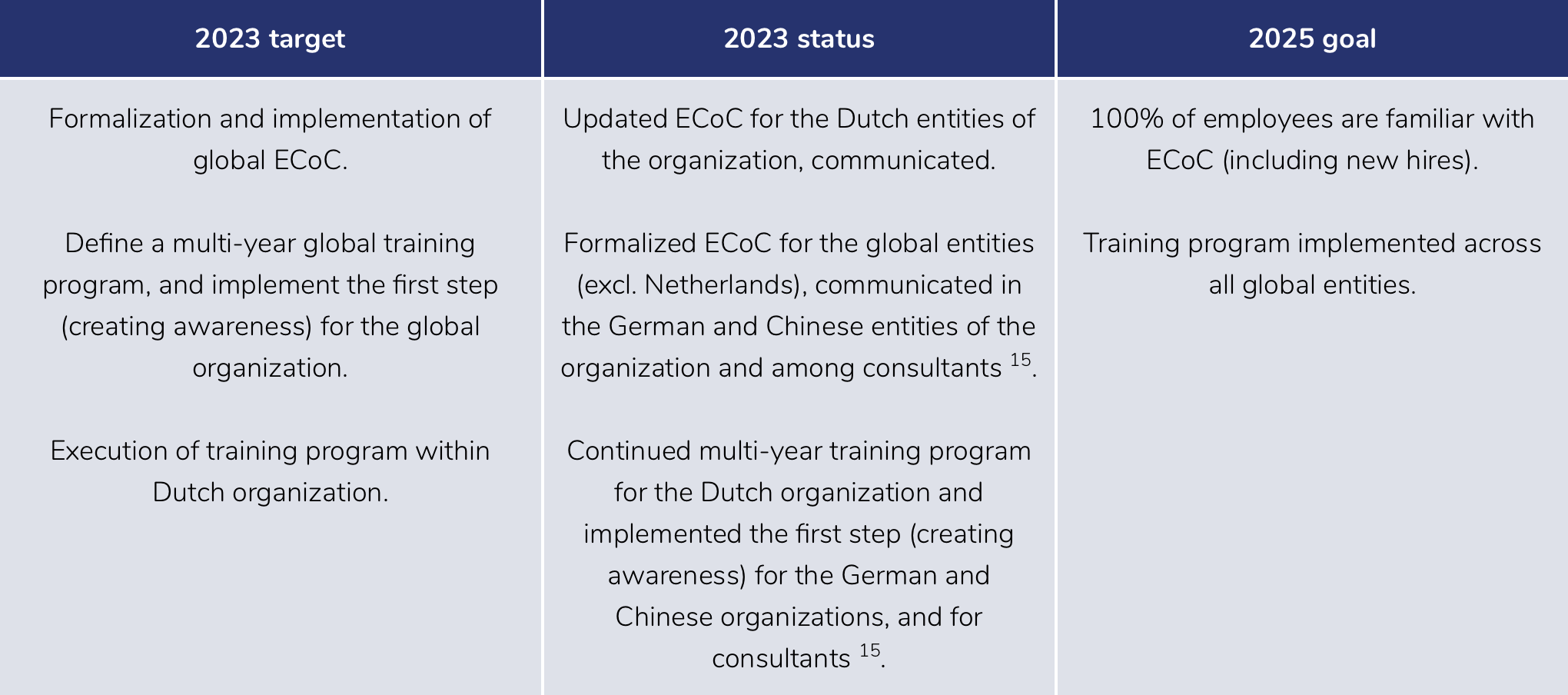
Our ECoC defines what a responsible way of working is for our employees, based on and according to our Guiding Principles. Ethical behavior, including the non-acceptance of bribery or any other form of corruption, is a critical element. With our Human Resources Department in the lead, we continued our multi-year Training Program for our Dutch organization. Continuously creating awareness is crucial in fostering ethical behavior and ensuring compliance.
Also in 2023, our Board of Management formalized and approved the ECoC for the global entities. Drafted collaboratively in 2022 with our entities in Italy, India, China, and Germany, the global ECoC mirrors our Dutch entities’ Policy, while taking local customs - if possible - into account for full acceptance. Similar to the approach taken for our Dutch entities in 2022, the first step involved communicating the ECoC and initiating the multi-year Training Program for the German and Chinese organizations, as well as for consultants 15 worldwide.
15 Limited to consultants who are part of our Sales and Technicians organization
The ongoing multi-year training program for our employees in the Dutch organization was tailored to incorporate the updated ECoC. In December, the first step of the multi-year program was executed for the German and Chinese organizations, as well as for consultants. Through comprehensive online training sessions, we (re)established awareness and a basic understanding of the ECoC in practice. Prevention of corruption and bribery remained repetitive key topics and will be addressed each year.
As a result, 93% of our total employees in the Smit Group (excl. consultants) participated in the 2023 online training.
In 2023, the internal implementation and Training Program included:
In the Dutch group entities, all employees were asked to confirm they have ‘read and understood’ the updated ECoC in our internal document and quality management system (Manual Master). The revised ECoC was included in the onboarding program, ensuring all new hires and interns in the Dutch group entities signed for the receipt of the Policy. During 2023, these new hires were also asked to confirm they had ‘read and understood’ the document.
Employees in the German and Chinese group entities, along with consultants, were asked to confirm they have “read and understood” the ECoC via email.
As a result, 100% of our total employees in the Smit Group (excl. consultants) are fully informed on this Policy.
Our ECoC also includes the opportunity to report on suspected unlawful and inappropriate behavior, supported by our Whistle Blower Policy and Procedure for reporting cases of inappropriate behavior or unsafe working conditions. In 2023, there were three incidents reported, all investigated and closed. To ensure our ECoC supports a responsible way of working for all our employees, our HR department discusses annually with our designated Whistle Blower Officer and Confidential Counselor which behavioral topics need priority during our training.
Consistent with our Guiding Principles, diversity and inclusion is at the heart of our Company. Our ESG Policy and ECoC express our commitment to diversity and non-discrimination and define the expected responsible way of working. As one of our five Guiding Principles, diversity and inclusion also belong to the repetitive key topics that we will address each year in our multi-year training program on the Employee Code of Conduct. For the Dutch Entity, the Guiding Principles are implemented in our HR performance management system. As such, employees are asked to consider how they integrate diversity and inclusion into their daily work.
Our global workforce comprises 71% male and 29% female employees, representing 25 different nationalities and diverse age groups (73% male and 27% female in 2022). 30% of our global top management positions, comprising the Board of Management and their direct reports, are held by women. Notably, both male-female demographics exceed gender equality averages in the chemical industry 16. Diversity refers to the variety of differences between individuals and encompasses much more than age, gender, and nationality. For a chemical company like ours, it is a crucial driver for sparking innovation and bringing different perspectives together to refine an idea. We believe that having a diverse workplace where the voice and contribution of everyone are valued and recognized only adds to overall business success.
Diversity & Inclusion
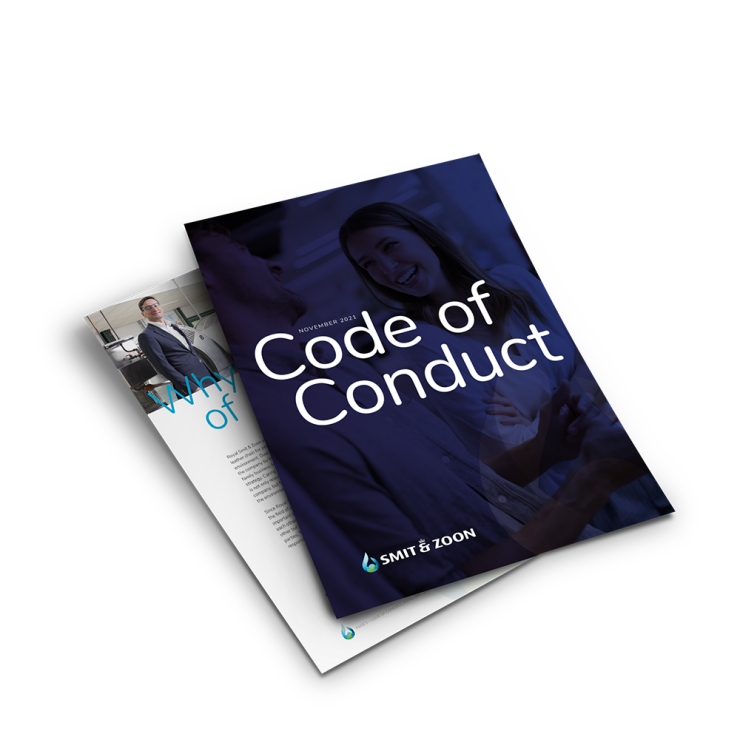
To establish and maintain consistent trust with our customers and society, we adopt a comprehensive approach that integrates policies, risk assessments, technical and non-technical measures and procedures, and employee training to effectively mitigate information security risks. Our commitment to information security, including data privacy, is a critical element in our ESG Policy and Employee Code of Conduct (ECoC). Additionally, we have a specific Cyber Security Policy, Information (Data) Security (ICT) Policy, and Incident Management Policy in place. Annually, we engage external parties to conduct Cyber Security Risk assessments, and its findings are reported and accurately acted on to facilitate a continuous improvement cycle. Incident Response and Business Continuity Plans, supported by accompanying monitoring and control procedures, are in place to act immediately when - despite our Policies and Procedures - incidents occur. In 2023, Royal Smit & Zoon had no reportable incidents of information and/or cyber security breaches.
Our employees participate in mandatory online training modules throughout the year, equipping them to prevent and promptly trace potential information security threats and adequately act and report on incidents. In 2023, the online training program was expanded to our employees in China.
Each employee globally completes around 35 training modules per year, accumulating 15 hours of information security training per employee in 2023. Additionally, classroom session is offered in the Netherlands, China and Italy for those who prefer in-person training. In addition, we performed 7 phishing tests in 2023 (up from 4 in 2022) and pro-actively sent out communications about any Cyber security challenges.
For 2024, we plan to conduct vulnerability scans and grey box pentests on our network, websites and cloud environment. A "grey pentest" typically refers to a penetration test that involves ethical hackers with partial knowledge of the target system or network. This middle-ground approach allows testers to simulate an attack with a combination of insider and outsider perspectives, providing a more realistic assessment of potential vulnerabilities. Furthermore, we will perform scans of employee information on the Dark web and conduct social engineering tests will be performed. Findings will be reported and accurately acted upon to ensure continuous enhancement of our security measures.
Information Security

UN SDG goals
We addressed a series of Double Materiality Matrix topics, including Business conduct & Ethics, Responsible supply chain management and engagement, Product Stewardship, Human Rights & labor practices, Talent attraction, retention & development, Diversity, Equity & Inclusion.


To establish and maintain consistent trust with our customers and society, we adopt a comprehensive approach that integrates policies, risk assessments, technical and non-technical measures and procedures, and employee training to effectively mitigate information security risks. Our commitment to information security, including data privacy, is a critical element in our ESG Policy and Employee Code of Conduct (ECoC). Additionally, we have a specific Cyber Security Policy, Information (Data) Security (ICT) Policy, and Incident Management Policy in place. Annually, we engage external parties to conduct Cyber Security Risk assessments, and its findings are reported and accurately acted on to facilitate a continuous improvement cycle. Incident Response and Business Continuity Plans, supported by accompanying monitoring and control procedures, are in place to act immediately when - despite our Policies and Procedures - incidents occur. In 2023, Royal Smit & Zoon had no reportable incidents of information and/or cyber security breaches.
Our employees participate in mandatory online training modules throughout the year, equipping them to prevent and promptly trace potential information security threats and adequately act and report on incidents. In 2023, the online training program was expanded to our employees in China.
Each employee globally completes around 35 training modules per year, accumulating 15 hours of information security training per employee in 2023. Additionally, classroom session is offered in the Netherlands, China and Italy for those who prefer in-person training. In addition, we performed 7 phishing tests in 2023 (up from 4 in 2022) and pro-actively sent out communications about any Cyber security challenges.
For 2024, we plan to conduct vulnerability scans and grey box pentests on our network, websites and cloud environment. A "grey pentest" typically refers to a penetration test that involves ethical hackers with partial knowledge of the target system or network. This middle-ground approach allows testers to simulate an attack with a combination of insider and outsider perspectives, providing a more realistic assessment of potential vulnerabilities. Furthermore, we will perform scans of employee information on the Dark web and conduct social engineering tests will be performed. Findings will be reported and accurately acted upon to ensure continuous enhancement of our security measures.
Information Security

Consistent with our Guiding Principles, diversity and inclusion is at the heart of our Company. Our ESG Policy and ECoC express our commitment to diversity and non-discrimination and define the expected responsible way of working. As one of our five Guiding Principles, diversity and inclusion also belong to the repetitive key topics that we will address each year in our multi-year training program on the Employee Code of Conduct. For the Dutch Entity, the Guiding Principles are implemented in our HR performance management system. As such, employees are asked to consider how they integrate diversity and inclusion into their daily work.
Our global workforce comprises 71% male and 29% female employees, representing 25 different nationalities and diverse age groups (73% male and 27% female in 2022). 30% of our global top management positions, comprising the Board of Management and their direct reports, are held by women. Notably, both male-female demographics exceed gender equality averages in the chemical industry 16. Diversity refers to the variety of differences between individuals and encompasses much more than age, gender, and nationality. For a chemical company like ours, it is a crucial driver for sparking innovation and bringing different perspectives together to refine an idea. We believe that having a diverse workplace where the voice and contribution of everyone are valued and recognized only adds to overall business success.
Diversity & Inclusion
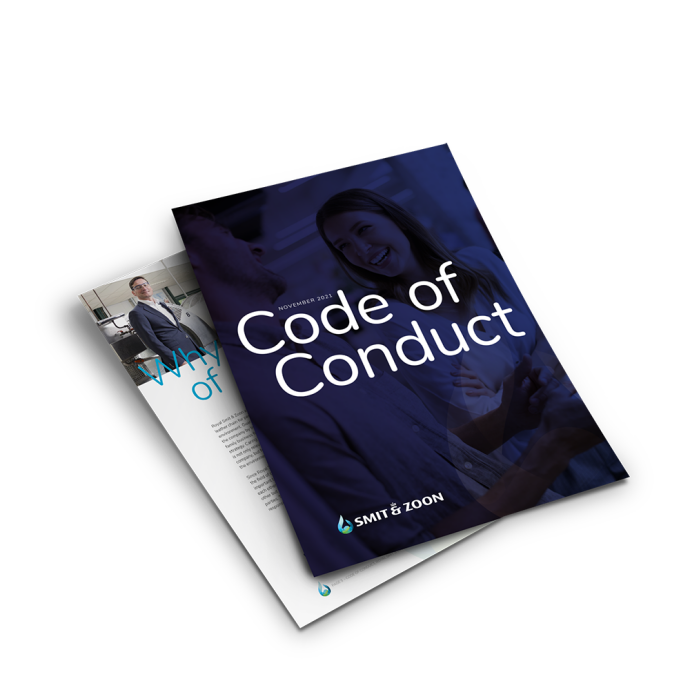
Our ECoC also includes the opportunity to report on suspected unlawful and inappropriate behavior, supported by our Whistle Blower Policy and Procedure for reporting cases of inappropriate behavior or unsafe working conditions. In 2023, there were three incidents reported, all investigated and closed. To ensure our ECoC supports a responsible way of working for all our employees, our HR department discusses annually with our designated Whistle Blower Officer and Confidential Counselor which behavioral topics need priority during our training.
The ongoing multi-year training program for our employees in the Dutch organization was tailored to incorporate the updated ECoC. In December, the first step of the multi-year program was executed for the German and Chinese organizations, as well as for consultants. Through comprehensive online training sessions, we (re)established awareness and a basic understanding of the ECoC in practice. Prevention of corruption and bribery remained repetitive key topics and will be addressed each year.
As a result, 93% of our total employees in the Smit Group (excl. consultants) participated in the 2023 online training.
In 2023, the internal implementation and Training Program included:
In the Dutch group entities, all employees were asked to confirm they have ‘read and understood’ the updated ECoC in our internal document and quality management system (Manual Master). The revised ECoC was included in the onboarding program, ensuring all new hires and interns in the Dutch group entities signed for the receipt of the Policy. During 2023, these new hires were also asked to confirm they had ‘read and understood’ the document.
Employees in the German and Chinese group entities, along with consultants, were asked to confirm they have “read and understood” the ECoC via email.
As a result, 100% of our total employees in the Smit Group (excl. consultants) are fully informed on this Policy.

UN SDG goals
We addressed a series of Double Materiality Matrix topics, including Business conduct & Ethics, Responsible supply chain management and engagement, Product Stewardship, Human Rights & labor practices, Talent attraction, retention & development, Diversity, Equity & Inclusion.

15 Limited to consultants who are part of our Sales and Technicians organization
Our ECoC defines what a responsible way of working is for our employees, based on and according to our Guiding Principles. Ethical behavior, including the non-acceptance of bribery or any other form of corruption, is a critical element. With our Human Resources Department in the lead, we continued our multi-year Training Program for our Dutch organization. Continuously creating awareness is crucial in fostering ethical behavior and ensuring compliance.
Also in 2023, our Board of Management formalized and approved the ECoC for the global entities. Drafted collaboratively in 2022 with our entities in Italy, India, China, and Germany, the global ECoC mirrors our Dutch entities’ Policy, while taking local customs - if possible - into account for full acceptance. Similar to the approach taken for our Dutch entities in 2022, the first step involved communicating the ECoC and initiating the multi-year Training Program for the German and Chinese organizations, as well as for consultants 15 worldwide.
Please swipe to view full table

In 2023, the Employee Code of Conduct (ECoC) for the Netherlands was updated from its original 2021 version and communicated across the Dutch entities of Royal Smit & Zoon. This enhanced version of our Employee Code of Conduct is the result of integration of insights from various third-party audits, reflecting our commitment to continuous improvement. We adhere to the Plan-Do-Check-Act, showing our dedication to best practices also in this domain.
Our Employee Code of Conduct (ECoC) guides our day-to-day business

12 This concerns suppliers related to Dutch entity. Key suppliers have an annual spend of over Euro 200K and cover 80% of the top spend.
13 Our initial step involved assessing the current EcoVadis rating of our key suppliers.
14 This concerns suppliers related to all global entities. Key suppliers have an annual spend of over Euro 200K and cover 80% of the top spend.

Please swipe to view full table
We only work with strategic suppliers who consider sustainability to be a vital part of the way they conduct business. Our Business Partner Code of Conduct (BPCoC) is already in place since 2018. All of our suppliers are expected to work according to our BPCoC, which requires them to respect human and labor rights, responsibly use the environment and natural resources, and comply with all applicable legislation, regulations, and ethical standards. The principles and standards included in this document reflect those established in our own ESG Policy and Code of Conduct for employees. By asking our Business Partners to commit to the same principles and standards that guide our business, we facilitate a stronger and uniform commitment to creating a sustainable leather value chain. Since 2018, the BPCoC has been introduced with our key suppliers8 and targets have been set to ensure that all our suppliers will explicitly commit to it in 2025. At the same time, our continuous improvement approach drives us to carefully reflect on expected supply chain diligence legislation and our current requirements and approach for Business Partners regarding ESG.
Our vast belief in the ‘Power of Partnerships’ also means we partner with our first-tier suppliers (upstream) and Business Partners downstream. Working on a basis of respect and mutual trust while advancing on diversity, such collaborations drive continuous improvement in responsible business practices and create a real positive impact in making the leather value chain more sustainable, both upstream and downstream.
For example, in 2022, we partnered with a first-tier supplier on a responsible sourcing issue brought up by a customer demanding compliance with the new German Supply Chain Due Diligence Act (SCDDA), ensuring responsibly mined and processed bauxite/aluminum. An ingredient of our Nera-tanning product Zeology is produced from alumina trihydrate (ATH), of which the raw material is mined bauxite. As a result of good collaboration across the value chain, the bauxite/ATH/aluminum used for Zeology has been certified according to well-known and reputable ESG industry standards.
Another example is our partnership with our customer and downstream Business Partner Lhasa Leather factory, a state-owned tannery enterprise in Tibet that produces leather from local hides into the brand YAK. About 400,000 farmers and herdsmen in the region benefit, providing socio-economic development to the ethnic minorities in this region. Lhasa Leather Factory and Royal Smit & Zoon have partnered on a technical collaboration on using the chromium-free, aldehyde-free, and heavy-metal-free tanning agent Zeology. This partnership ensures an upgrade and optimization of the leather production process with significantly less environmental impact. Heavy metals and pollutants from wastewater can be recovered with minimal energy consumption, and solid waste from production is compostable. At the same time, the yak leather products can be sold as recyclable and can technically be treated to turn into an eco-fertilizer (in an eco-friendly way) in 2 months. Zeology-tanned YAK leather is the lowest carbon-intensity leather in China.
We only work with key suppliers who consider sustainability to be a vital part of the way they conduct business. Our Business Partner Code of Conduct (BPCoC) is already in place since 2018. All of our suppliers worldwide are expected to work according to our BPCoC, which requires them to respect human and labor rights, responsibly use the environment and natural resources, and comply with all applicable legislation, regulations, and ethical standards. The principles and standards included in this document reflect those established in our own ESG Policy and Employee Code of Conduct. By asking our Business Partners to commit to the same principles and standards that guide our business, we facilitate a stronger and uniform commitment to creating a sustainable leather value chain. The BPCoC is also an integral part of the business agreement between Royal Smit & Zoon and the Business Partner, where possible outlined in a contractual clause. Since 2018, the BPCoC has been progressively introduced with our key suppliers 12. Targets have been set to ensure commitment from all global key suppliers worldwide by 2025. The Table above indicates the percentage of key suppliers introduced to and independently signed the BPCoC document.
Recognizing the importance of good governance in creating a sustainable leather value chain, we are committed to continuously improving responsible supply chain management. This includes ensuring suppliers meet the same criteria customers expect from us and engagement with them on environmental and social impacts and risks. Additionally, we are mindful of evolving supply chain due diligence regulations. In 2023, we therefore started the process of analyzing the EcoVadis rating from our suppliers as part of the annual supplier evaluation process. As we uphold high standards for ourselves in the EcoVadis assessment process and ranking, we consider this rating a crucial indicator of our suppliers’ performance in creating a more sustainable leather value chain. Our initial step involved assessing the current EcoVadis rating of our key suppliers 13. Based on our assessment, it is evident that Ecovadis ratings are widely used and accepted in the chemical industry, where we find the majority of our suppliers. As a result, we decided to leverage Ecovadis ratings as a relevant indicator for evaluating the ESG performance of our suppliers. As part of our ongoing efforts, we will expand this evaluation to include more suppliers, establish a target for them to attain a minimum score, and actively engage with them to adopt more responsible and sustainable practices. Above efforts also align with our commitment to advancing supply chain transparency.
We recognize the connection between responsible supply chain management and a comprehensive understanding of social and environmental risks in raw material procurement. That is why, in 2023, one member of our Purchase team achieved NEVI Private 1 training certification, covering also socially responsible procurement, ethics and sustainability. Additionally, another member of our Dutch purchasing team underwent external training on socially responsible and circular procurement. Both the EcoVadis assessment of suppliers and participation in these trainings were incorporated into our sustainable procurement objectives, integrated into the buyers’ performance reviews.
We also understand that responsible procurement of raw materials is a crucial part of building a sustainable supply chain. For example, as a large processor of fish oil and as stipulated in our ESG Policy, we only source our fish oils from fish farming or from fishing areas subject to thorough monitoring and assessment by both the FAO and local research institutes. This ensures the fish is not at risk of depletion or do not originate directly or indirectly from Illegal, Unreported and Unregulated (IUU) fishing, contributing to biodiversity protection and fostering a more sustainable supply chain.
Already in 2022 - as another example -, we partnered with a first-tier supplier on a responsible sourcing issue brought up by a customer demanding compliance with the new German Supply Chain Due Diligence Act (SCDDA), ensuring responsibly mined and processed bauxite/aluminium. Zeolite, an important ingredient of our Nera-tanning product Zeology is produced from alumina trihydrate (ATH), for which the raw material is mined bauxite. As a result of good collaboration across the value chain, we can guarantee since 2022 that the ATH used to produce the zeolite for our tanning product Zeology meets the highest ESG standards and has been certified according to the Aluminium Stewardship Initiative (ASI) standards since 2022. This way Nera guarantees that all steps in our value chain from the bauxite mining until and including the production of zeolite comply with the ASI Performance Standard and the ASI Chain of Custody Standard. ASI standards address various ESG topics such as environmental impact, material stewardship, human and labour rights, and business governance. In 2023, next to working with certified zeolite, Nera has become a member of the Aluminium Stewardship Initiative.
With our vast belief in the ‘Power of Partnerships’, this also means we collaborate with our first-tier suppliers (upstream) and Business Partners downstream. Working on a basis of respect and mutual trust while advancing on diversity, such collaborations drive continuous improvement in responsible business practices and create a real positive impact in making the leather value chain more sustainable, both upstream and downstream.
An example is our collaboration with our customer and downstream Business Partner The Third Pole of the Earth Leather Industrial Company Ltd., a state-owned tannery enterprise in Xizang (Tibet Autonomous Region) that produces leather from local hides into the brand YAK.
Our key suppliers commit to our Business Partner Code of Conduct

Please swipe to view full table
Our Business Partner Code of Conduct (BPCoC) has been in place since 2018 and is an integral part of our Sales Partner Agreements. At Royal Smit & Zoon, we strongly encourage our Business Partners to play a catalyzing role in not only meeting but exceeding the business principles as set forward in this Code of Conduct. In 2021, we initiated a pilot Sales Partner Program with a selection of our agents. The primary objective of this program is to ensure that our Sales Partners understand and are prepared to meet the standards and requirements in ESG practices as set by Royal Smit & Zoon and the broader leather value chain. Covid-19 travel limitations and the lockdown in China made the continuation and implementation of the pilot program during 2022 challenging.
Given our Company’s commitment to playing a positive and pivotal role within the leather value chain, collaboration with our Sales Partners on ESG standards and requirements is a key priority. Working hand in hand with our Sales Partners inevitably involves addressing a wide range of economic, environmental, and social impacts, working with industry standards, and meeting (upcoming) laws and regulations. It is only when working according to the same principles and standards that we can effectively fulfill our mission of creating a sustainable leather value chain, together.
In response to the evolving ESG landscape, in 2023, we redefined and relaunched our Sales Partner Program to assure alignment with current standards and continue driving progress and transformative action across the entire leather value chain. As a leading provider of specialty chemicals to the leather industry, safety and health comes first in all our activities. It is our duty to minimize potential risks inherent to our chemical industry operations and ensure the safe use of our chemicals. More than in any area, we expect that our Sales Partners will operate according to our principles and standards.
In 2023, we developed the “Agent recommendations for the Safe Management & Handling of Chemicals”. These recommendations, building upon our BPCoC, align with the Chemical Management Module of the latest LWG Leather Manufacturer Audit Protocol and associated ZDHC requirements.
The document's purpose is to inform our Sales Partners of the expectations placed on them regarding the safe management and handling of chemicals. Moreover, it aims to encourage and support them in meeting these expectations and enable them to show compliance with LWG and ZDHC requirements.
Early 2023, we conducted internal training for our sales and technicians worldwide on the document. We instructed them how to discuss and engage with our Sales Partners on these matters, and guide them through completing the accompanying self-check for continuous improvement - an ESG target set by our technicians for 2023. Later in 2023, we started our global training program by region for our Sales Partners on the safe management & handling of chemicals. In 2024, our objective is to have engaged all our Sales Partners across all 4 regions. Simultaneously, our technicians will continue engaging our Sales Partners on this topic to ensure facilitating an ongoing learning process on this pivotal subject.
Sales agents & distributors are involved in our Sales Partner Program

Please swipe to view full table
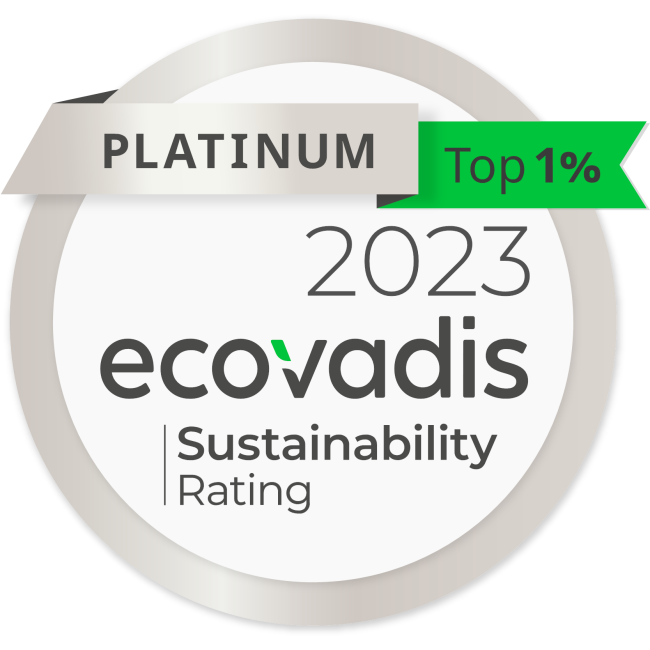
Royal Smit & Zoon started to collaborate with EcoVadis in 2015. Ecovadis is a globally recognized methodology that assesses the sustainability performance of more than 75.000 organisations worldwide across a range of criteria grouped into 4 impact themes: Environment”, “Labor & Human Rights”, “Ethics” and “Sustainable Procurement”. The assessment criteria are based upon international sustainable development standards such as the Global Compact Principles, the International Labour Organization (ILO) conventions, the Global Reporting Initiative (GRI) standard, and the ISO 26000 standards. These evidence-based assessments are refined into easy-to-read scorecards, providing zero to one hundred (0-100) scores, and medals (bronze, silver, gold, platinum).
In 2023, Royal Smit & Zoon proudly achieved the EcoVadis PLATINUM rating. Until 2020, we were accredited with the EcoVadis SILVER rating. In 2021 and 2022, EcoVadis accredited us with a GOLD rating. Up 15 points from 2022 (from 67 to 82 points), the EcoVadis PLATINUM rating demonstrates our ongoing efforts true to our mission to “Create a socially and environmentally sustainable leather value chain, together”. We are very proud that, with this recognition, Royal Smit & Zoon belongs to the top 1% of companies assessed by EcoVadis.
EcoVadis remains committed to the continuous improvement of its assessment, actively contributing to sustainability practices across value chains, fostering transparency and driving innovation. Originally outlined in our ESG Roadmap 2025, our KPI was to maintain the EcoVadis GOLD rating. Remarkably, we exceeded our own goal by achieving the EcoVadis PLATINUM rating already this year. While we consider this achievement a real milestone, we merely see it as a catalyst and opportunity to only guide us for ongoing improvements in the future.
EcoVadis Platinum rating rewards our ESG leadership

Please swipe to view full table
All incentive programs include ESG targets
Over the preceding years, Board of Management and a selection of key management positions and specific job holders already had ESG targets as part of their incentive programs. This practice confirmed our belief that integrating sustainability related performance in incentive schemes is instrumental in continuous improvement. Personal ESG targets empower our employees to integrate our Guiding Principles in their daily work, align their actions with our mission of ‘creating a socially and environmentally sustainable leather value chain together’ and contribute to our ESG ambitions. In 2023, we integrated ESG targets for all key management positions (including the Board of Management and their direct reports) and all specific job holders into the incentive programs.
Each individual’s ESG target was collaboratively defined with their line manager, Human Resources and our ESG Director. This approach ensured that the ESG targets suited the employees’ areas of responsibility, were practical and advanced our ESG ambitions. The Board of Management approved the set ESG targets. Special emphasis was placed on addressing historical challenges, such as the gap in ESG targets for our technical sales employees. Concreted efforts were directed to engaging this group and define suitable and effective ESG targets. ESG Targets weighted 10% in the overall variable remuneration opportunities.
The ESG targets for 2023 encompassed a range of initiatives. This included engaging our customers, brands and suppliers in our Double Materiality Assessment and ESG Strategy update, assisting customers in achieving their ESG Targets through sustainable solutions, collaborating with our Sales Partners on the safe management & handling of chemicals, optimizing our Product Passport, evaluating the ESG Performance of our Suppliers and calculating the scope 3 GHG Emissions of our downstream transport.
While the majority of ESG targets were successfully met, those aimed at our Sales Partners posed greater challenges. This can be attributed to the challenging economic landscape and travel limitations, which significantly impacted daily priorities and engagement levels, particularly for our technical sales employees. Initiating a global training program on the safe management and handling of chemicals for our Sales Partners, will actively involve them in this aspect and ensure achieving the initial target set for our technical sales employees.
For 2024, we will remain committed to incorporating ESG Targets in our incentive programs. These will be tailored to each employees’ areas of responsibility, supporting execution of our ESG Strategy.
For Royal Smit & Zoon, it’s important that everything we do is built on a strong foundation. Here we describe our commitments towards Governance, focusing on our ESG Roadmap 2025 commitments.
Achievements
Governance
